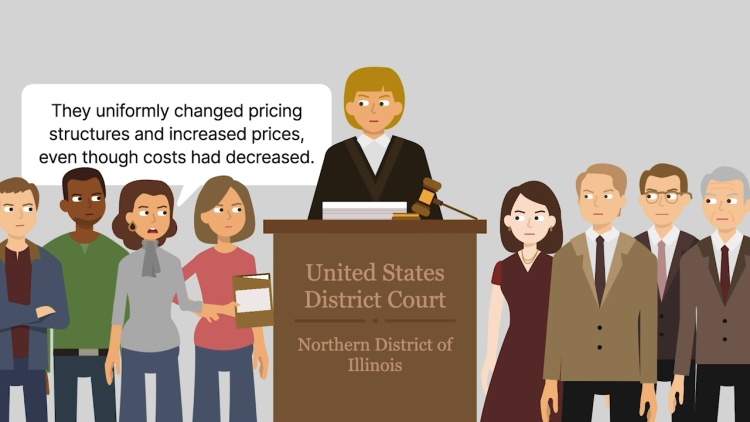In re Text Messaging Antitrust Litigation
United States Court of Appeals for the Seventh Circuit
782 F.3d 867 (2015)

- Written by Sean Carroll, JD
Facts
The plaintiffs filed a class action suit, alleging that AT&T, Verizon, Sprint, and T-Mobile (carriers) and a trade association to which they belonged (collectively defendants) conspired to fix text messaging prices in violation of the Sherman Act. The carriers supplied 90 percent of the text messaging service in the country and exchanged pricing information at their trade association meetings. The plaintiffs presented evidence that the carriers uniformly changed pricing structures to encourage volume-based discounts. The plaintiffs also presented evidence that the carriers increased their prices for price per use (PPU) text messages despite the fact that the cost of providing text messaging services had decreased. Although the plaintiffs’ complaint did not contain direct evidence of price fixing, the district court denied the carriers’ motion to dismiss for failure to state a claim. The carriers appealed. The United States Court of Appeals for the Seventh Circuit affirmed, finding that circumstantial evidence of the conspiracy was sufficient to support the plaintiffs’ claim. To withstand a motion to dismiss, an antitrust complaint need only state a plausible claim of price fixing. Any actual price fixing could be revealed during discovery. After discovery, the plaintiffs produced an email from one T-Mobile executive to another stating that the company’s text messaging price increase “was colusive [sic] and opportunistic,” which they claimed was evidence of deliberate collusion. The carriers argued that they engaged in merely tacit collusion. The district court granted the carriers’ motion for summary judgment. The plaintiffs appealed.
Rule of Law
Issue
Holding and Reasoning (Posner, J.)
What to do next…
Here's why 907,000 law students have relied on our case briefs:
- Written by law professors and practitioners, not other law students. 47,100 briefs, keyed to 996 casebooks. Top-notch customer support.
- The right amount of information, includes the facts, issues, rule of law, holding and reasoning, and any concurrences and dissents.
- Access in your classes, works on your mobile and tablet. Massive library of related video lessons and high quality multiple-choice questions.
- Easy to use, uniform format for every case brief. Written in plain English, not in legalese. Our briefs summarize and simplify; they don’t just repeat the court’s language.





